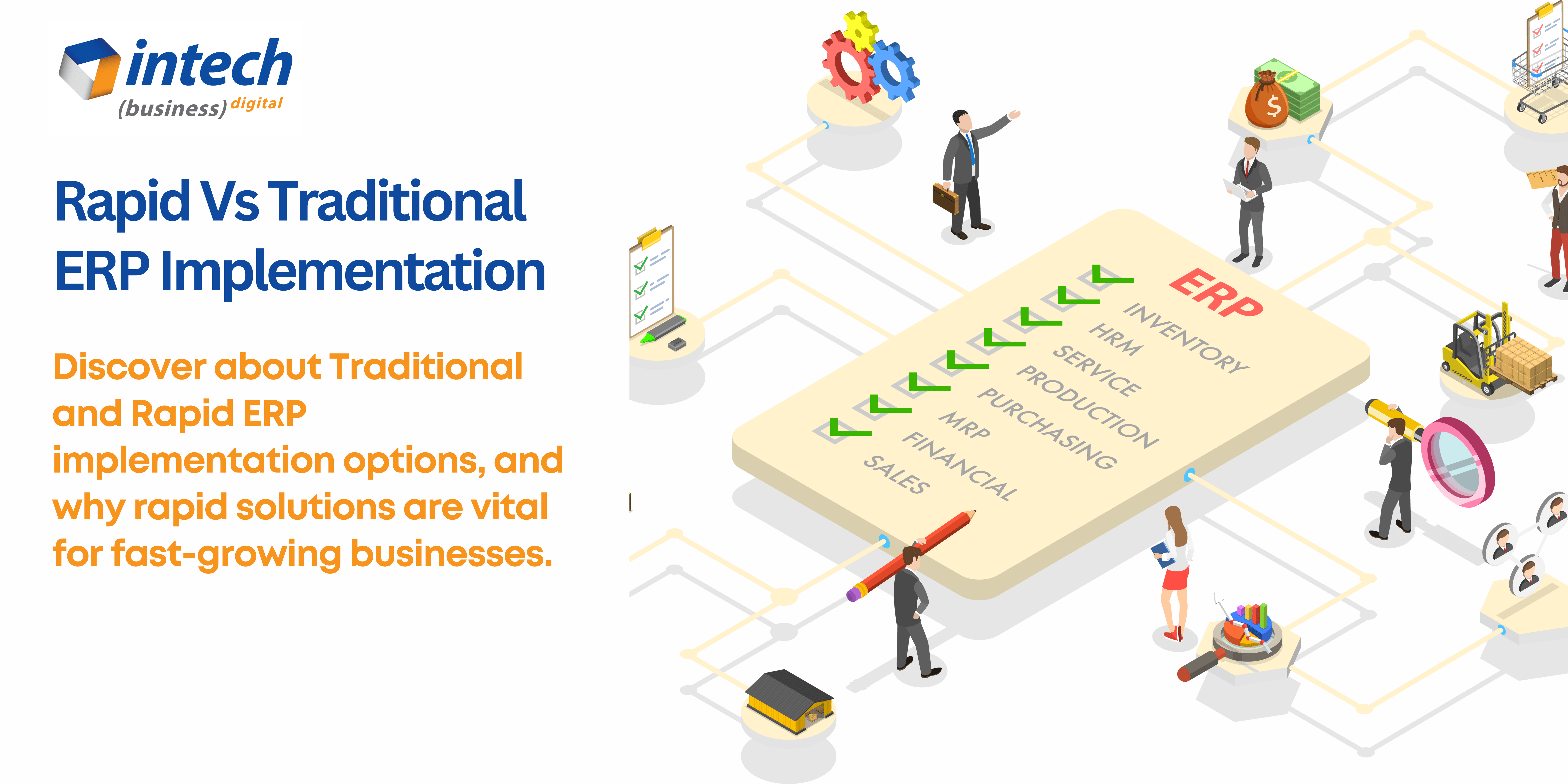Rapid Vs Traditional ERP Implementation

Rapid Vs Traditional ERP Implementation
In this age of digitization, the strategic management of resources has taken center stage, reshaping the dynamics of success for organizations. If we went back a decade and asked businesses about their plans for using Enterprise Resource Planning software, the responses would have been quite different from the early 1990s. Some were cautiously optimistic, preferring a gradual shift to the new ERP, while others were skeptical. As the demand for better business management grew, so did the variety of software solutions worldwide. The need for efficient business management software skyrocketed along with the increasing options available to enterprises globally. Amidst this digital revolution, where strategic resource planning is paramount, emerged a pressing demand for a rapid implementation approach to swiftly adapt and thrive in the fast-paced business landscape. In this article, we’ll dive into the world of Traditional and Rapid ERP implementation options, uncovering the reasons why a Rapid solution is a must for businesses on the fast track to expansion.
Traditional Deployment Approach
An ERP deployment is conventionally done gradually under the careful supervision of IT specialists, involving substantial customizations and thorough testing. This traditional deployment approach places more emphasis on customizing the system to meet particular company goals, which frequently results in more expensive upfront expenses and longer implementation timelines as opposed to rapid deployment techniques.
Conventional ERP deployment takes a lot of time and money because it includes planning, pilot testing, configuration, and launch.
- While control is provided by the standard ERP solution, it may not be appropriate for smaller firms and requires continuous IT competence.
- Although this approach links divisions such as finance, sales, and HR, its implementation can be costly and time-consuming.
- Adoption of traditional ERPs is organized and involves intensive IT oversight and maintenance.
- Even while traditional ERP offers complete control, businesses with fewer resources or users with less experience may not find it to be the ideal fit.
Rapid Deployment Approach
Rapid ERP deployment stands as a proactive approach aimed at optimizing project timelines and reducing costs. By leveraging pre-built templates, it accelerates decision-making and shortens discovery stages. The emphasis here is on swift implementation, aiming to empower businesses to stay ahead in a dynamic market.
This approach not only expedites deployment but also positions itself as the SMBs’ best course of action. It prioritizes efficiency and cost-effectiveness, aligning seamlessly with the fast-paced growth ambitions of small and medium-sized businesses.
Why Rapid implementation is the best course of action and how it can revolutionize the way SMBs operate
- Rapid deployment strategies generally involve the utilization of pre-established or plug-and-play templates, accelerating decision-making processes, and streamlining the discovery stages, ultimately reducing project timelines.
- Businesses can achieve a faster time-to-value and concentrate on their core company activities such as sales, financials, purchase, etc., by implementing an ERP system more quickly and affordably by using a rapid ERP installation approach.
- SMBs that install ERP fast will also benefit from increased flexibility and agility, which will help them react swiftly to shifting consumer demands and market situations.
This streamlined approach ensures agility and reactivity to changing market dynamics by optimizing resource utilization and enhancing overall business performance, empowering SMBs to successfully compete in today’s fast-paced business world.
In conclusion, the key takeaway is that businesses can achieve significant success through swift ERP implementations without overhauling their existing systems. Leveraging the inherent capabilities and power of the base system is a strategic approach. Today, more and more businesses are investing in ERP software such as Business Central to manage their core business processes. Intech Systems, with its profound understanding of current market trends and expertly tailored sales, finance, purchase, assembly, and warehouse modules, offers rapid Business Central solutions that can have your operations up and running in just a matter of weeks.
Do you want to learn more about Intech’s rapid Business Central implementation packages and how you can automate production orders, sales invoices, purchase orders, inventory tracking, etc, all within 4-10 weeks? Check out our offerings here: https://intech-systems.com/business-central-implementation-packages/.
About Intech
Intech Systems is a three-cloud Microsoft-certified partner that boasts deep expertise in providing digital transformation solutions for organizations by leveraging the Microsoft 365, Dynamics 365, and Azure solution stack. Intech is recognized as a top-tier Microsoft implementation partner globally and specializes in transformative technology solutions such as ERP (Enterprise Resource Planning), CRM (Customer Relationship Management), Business Process Automation, Business Intelligence, Cloud Infrastructure, Data Management, Productivity & Collaboration and Generative AI (Gen-AI) solutions. As a trusted Microsoft Solutions Partner, we are capable of doing complex technology implementations catered to an organization’s specific needs & also rapid solution implementation such as our Microsoft Dynamics 365 Business Central implementation packages. We pair our implementations with end-to-end customer support, offshore development & 3rd party integrations. With offices in India, USA (United States of America), and Singapore, we work with clients across globe to empower businesses with cutting-edge technology solutions. Our latest services aim at delivering business ready AI solutions to the customer, like our Microsoft Copilot Consulting Services & Solutions for small, medium & large enterprises. Intech’s expertise lies in building software solutions for Manufacturing, Professional Services & Healthcare. Our Dealer Management System, Sales and Service CRM for Manufacturing, Field Force Automation for Pharmaceuticals and Manufacturing Central are some of our leading industry solutions. Intech’s vision is to catalyze digital futures for operation-centric industries globally, we are at the forefront of innovation, helping organizations drive growth and innovation like never before. Contact Us to learn more.

Looking for a Microsoft Partner you can trust for project implementation?
What's New

Top Reasons to Replace Dynamics GP with Business Central [2025]
Introduction: The clock is ticking for businesses still operating on Microsoft Dynamics GP. While it...

How AI Agents Are Redefining the Market Research Landscape
Do you know your competitors are decoding consumer behavior in hours using AI agents that...

How Agentic AI Is Transforming the Manufacturing Industry [2025]
Introduction Did you know that 91% of manufacturers are planning to increase their investment in...


